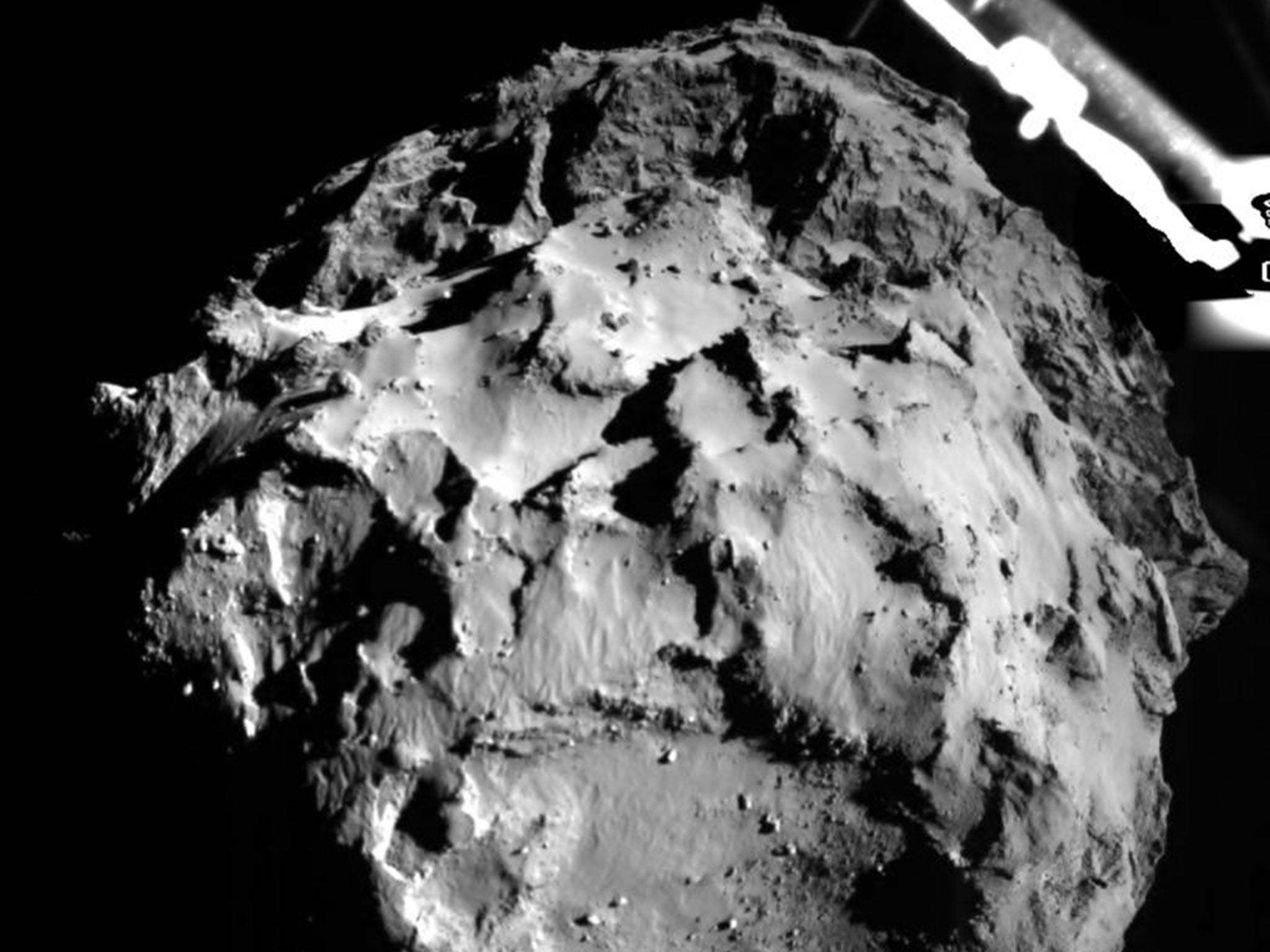Rosetta mission represents the very best side of human nature
The forces of darkness are on the march. All the more reason to celebrate Philae, rationality and the march of progress

It looked like a still from a low-budget sci-fi movie. Someone, it seemed, had left a supermarket trolley on the Moon, its sticky-out legs suggesting it might fall over at any moment. That impression was surprisingly close to reality, because it turned out that the European Space Agency's Philae lander had finished its 10-year journey to Comet 67P on its side. When its anchoring harpoons failed to fire, the lander bounced back up into space, coming down in the shadow of a boulder or cliff, which blocked sunlight to its solar panels.
Despite its awkward landing, Philae was able to send a stream of data back to Earth before its batteries started to run out, including the first close-up images of the surface of a comet. Who knew that it would look like a giant, chocolate-dusted truffle? I loved the pictures beamed back from the lander and its mothership, named Rosetta (after the stone which was the key to cracking hieroglyphs) by someone who presumably had a classical education. In recent years we've had Chris Hadfield's wonderful tweets from the international space station, but this time the images are from deep space.
The Rosetta project has rightly caused huge excitement, dominating last week's news bulletins and recalling the long-distant days of 1969 when Neil Armstrong became the first human – not the first man, thank you very much – to walk on the Moon. It would have been nice to see more women among the ecstatic scientists at the ESA operations centre in Darmstadt, especially as one of the astronomers who spotted Comet 67P in 1969 was a woman, Svetlana Gerasimenko. Obviously the ESA scientists were exhausted as well as excited, which may account for the bizarre shirt worn by one of the lead scientists, Dr Matt Taylor. He has since apologised for appearing on television sporting images of women in bondage gear, a choice of clothing some female scientists interpreted as confirming the male atmosphere of space exploration.
Despite that, I can't help thinking that projects such as this one represent the best side of human nature. Space scientists are the modern equivalent of the explorers of earlier centuries, who mapped the Earth and demonstrated, among other things, that it isn't flat. I can barely begin to visualise Rosetta's extraordinary journey, which covered a distance more than five times greater than that between the Earth and the Sun. It all makes a pleasant change from the dreadful images which have dominated the news this year, showing dead bodies and ruined buildings in Syria and Iraq.
I don't imagine that the Rosetta project has stirred much interest among the idiots flocking to fight for the preposterous Isis (or whatever it happens to call itself this week). Isis is just one of the movements hostile to education, science and the enlightenment which seem to be stalking the world at present; they're to be found not just in the Middle East but in Africa, where the terrorist organisation Boko Haram seized the Nigerian town of Chibok two days ago. The same group is still holding hundreds of schoolgirls abducted from Chibok earlier in the year, bringing their education to an abrupt end and forcing them into sexual servitude.
This is not a good moment for those of us who want desperately to believe in human progress. The ghastly history of the 20th century seemed to have persuaded large numbers of people to abandon totalitarian ideologies, although unhappy exceptions (such as North Korea) remain. It's been an unwelcome shock to realise that the threat to progress in the 21st century comes from a more traditional quarter, in the form of an extreme religious movement which wants to impose a caliphate on large sections of the world.
At first sight the conflict is between modernity and mediaeval theology, but it's more complicated than that; al-Qaeda and its offshoots don't reject the modern world in its entirety, displaying a paradoxical enthusiasm for some forms of modern technology. Isis boasts about capturing sophisticated military hardware from its enemies, and its fighters are happy to use modern communication methods to show scenes of mediaeval cruelty, such as beheadings.
The billions of dollars Western countries pour into the arms industry are hardly a sign of progress, and I'm aware that the 20th-century space race had a military dimension. But I also know that every culture that's ever existed has produced individuals who want answers to the most profound questions: How did the universe start? Where did life on Earth come from? Are there similar forms of life on other planets? They've been opposed by powerful institutions such as the Catholic Church, whose history of banning books and ideas is grim by any standards.
Let's not forget that in 1633 the Inquisition summoned one of the greatest scientists of the age, Galileo Galilei, to Rome and forced him to recant his support for Copernicus's theory that the Earth revolves round the Sun. Galileo believed that his great invention, the telescope, had proved the theory but the Vatican was having none of it. He was found guilty of heresy and placed under house arrest for the rest of his life.
The conflict between reason and science on the one hand, and dogma and superstition on the other, is as old as history. Now it can be summed up in two images: the clunky Philae lander, on its side in the dust, versus lorry-loads of Isis fighters with their horrible black flags and uniforms. The contrast is vivid, reminding all but the most deluded that science and reason deserve to win the argument. I'm happy to be on the side of men and women who reach, literally, for the stars.




Join our commenting forum
Join thought-provoking conversations, follow other Independent readers and see their replies